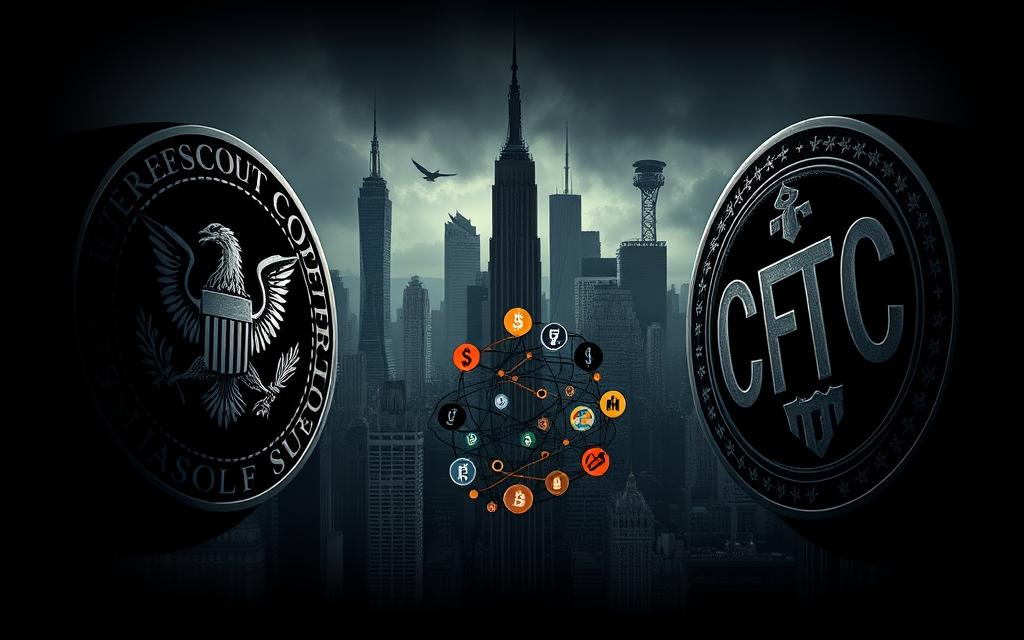Table of Contents
The U.S. regulatory landscape faces a critical question: how to classify digital assets. This debate shapes market rules, investor protections, and exchange operations. With the SEC and CFTC claiming overlapping jurisdictions, clarity remains elusive.
Recent lawsuits, like those against Ripple Labs, underscore the stakes. The SEC argues many tokens meet security criteria, while the CFTC labels Bitcoin and Ethereum as commodities. Congressional proposals, such as the RFIA, aim to resolve this tension.
For investors, classification impacts everything from trading access to legal risks. Gary Gensler’s firm stance—that most tokens are securities—adds urgency. Understanding these dynamics helps navigate the evolving crypto ecosystem.
Understanding Commodities and Securities
Tangible goods like oil contrast sharply with profit-driven financial instruments. This distinction shapes how assets are traded, regulated, and perceived by investors.
What Defines a Commodity?
Commodities are raw materials—oil, wheat, gold—traded in bulk. The CFTC oversees derivatives like futures trading, ensuring market stability. These standardized products lack individual differentiation, much like Bitcoin’s fungibility.
What Defines a Security?
Stocks and bonds represent ownership or debt, requiring SEC registration. The Howey Test labels security if profits rely on third-party efforts. For example, agricultural land in SEC v. Howey (1946) mirrors modern token sales.
Key regulatory differences:
- SEC: Mandates transparency for investors.
- CFTC: Focuses on market integrity for commodity futures.
Bitcoin’s classification as a commodity stems from its uniformity, akin to a “sack of corn.” Meanwhile, tokens tied to developer promises often meet security criteria.
The Howey Test: A Key to Classification
A 1946 Supreme Court ruling still shapes today’s crypto regulations. The SEC relies on this precedent—the Howey Test—to determine if tokens qualify as securities. Projects failing this test face strict disclosure requirements.

Origins of the Howey Test
The test emerged from SEC v. W.J. Howey Co., a case involving citrus grove contracts. Investors leased land, relying on others to farm and sell crops. The Court ruled these leases were investment contracts, creating the four-part standard:
| Criteria | Application to Crypto |
|---|---|
| Money Investment | Token purchases (e.g., ICOs) |
| Common Enterprise | Pooled funds in DAOs |
| Profit Expectation | Speculative trading |
| Third-Party Efforts | Developer roadmaps |
Application to Cryptocurrencies
The SEC applied this test aggressively. Ripple’s XRP was deemed an unregistered security in 2020 due to centralized marketing. Similarly, Dapper Labs’ NBA Top Shot NFTs faced scrutiny for controlling blockchain access.
“A token with no utility beyond speculative trading likely meets the Howey Test.”
Decentralized projects like Bitcoin avoid classification by eliminating reliance on others’ efforts. Staking or governance tokens blur lines—investor participation may reduce third-party control risks.
Is Cryptocurrency a Commodity? The Case for Decentralization
Decentralized networks challenge traditional asset classifications, creating regulatory gray areas. The CFTC’s stance—that Bitcoin and Ethereum are commodities—rests on their fungibility and lack of centralized control. This view gained legal backing in the 2021 Bitfinex case, reinforcing the Commodity Exchange Act’s jurisdiction.
Bitcoin and the CFTC’s Stance
Under the CEA, the CFTC treats Bitcoin like gold—interchangeable and traded in standardized units. Chair Rostin Behnam affirmed this in 2023, citing its use as a store of value. Unlike securities, Bitcoin’s market dynamics mirror raw materials, with price driven by supply-demand rather than corporate performance.
Commodity Traits in Crypto Assets
Three factors solidify crypto’s commodity argument:
- Fungibility: One Bitcoin equals another, akin to oil barrels.
- Decentralization: DAOs and proof-of-stake reduce third-party reliance.
- Global Standards: EU’s MiCA framework treats digital assets as distinct from stocks.
DeFi projects amplify this by eliminating intermediaries. Yet, the SEC contests tokens tied to developer promises, creating a regulatory tug-of-war.
“Bitcoin’s design as a peer-to-peer system inherently resists securities classification.”
Is Cryptocurrency a Security? The SEC’s Perspective
Legal battles reveal stark consequences for misclassified crypto projects. The SEC treats many tokens as unregistered securities, triggering fines and operational hurdles. This stance forces firms to rethink fundraising and compliance strategies.
ICOs and Investment Contracts
Initial Coin Offerings (ICOs) often mirror IPOs, promising profits to investors. The SEC’s 2019 Framework for Digital Assets targets tokens marketed with speculative returns. Kik’s Kin token, for example, faced a $5M penalty after its CEO touted a “ton of money” for backers.
Key red flags include:
- Centralized promises: Developer roadmaps implying future value.
- Pooled funds: DAOs or team-controlled treasuries.
Notable SEC Enforcement Cases
Ripple’s XRP sales to institutions were deemed unregistered securities in 2020. The SEC argued Ripple’s marketing fueled profit expectations. Similarly, Kraken’s staking service settled charges for failing to register its program.
“Token projects must prove decentralization or face securities laws.”
State regulators amplify pressure. New York sued KuCoin over unregistered trading of tokens like Ether, despite the CFTC’s commodity designation. This patchwork enforcement leaves investors navigating unpredictable risks.
Regulatory Implications of Classification
Regulatory clarity remains a pressing issue for digital asset markets. Classification as a security or commodity dictates oversight, trading rules, and legal risks. This divide shapes how platforms operate and protect investors.

SEC Oversight vs. CFTC Authority
The SEC enforces strict disclosure for securities, while the CFTC monitors derivatives. This split creates operational hurdles:
- SEC-compliant exchanges must vet tokens under Howey Test criteria, often delisting assets like XRP.
- CFTC-regulated platforms focus on Bitcoin futures, but seek spot market control under RFIA proposals.
| Regulator | Focus | Key Requirements |
|---|---|---|
| SEC | Investor Protection | Registration, disclosures, anti-fraud |
| CFTC | Market Integrity | Derivatives oversight, anti-manipulation |
Impact on Exchanges and Listings
U.S. platforms face fragmented rules. New York’s BitLicense demands separate approvals, while offshore entities like Binance risk enforcement. The EU’s MiCA framework offers a unified approach, contrasting with U.S. patchwork laws.
“Exchanges walking the SEC-CFTC tightrope must prioritize compliance or face existential risks.”
Tax treatment further complicates matters. Securities trigger capital gains reporting, while commodities fall under simpler IRS guidelines. For investors, classification impacts access, costs, and legal exposure.
Market Impact and Investor Behavior
Regulatory decisions create waves across digital asset markets, shaping both short-term price action and long-term investment strategies. When authorities take action, investors react—sometimes dramatically.

Volatility and Regulatory News
Legal actions often trigger sharp price swings. XRP plunged 60% after the SEC lawsuit in 2020, showcasing how classification risks spook markets. Similarly, Bitcoin ETF approvals—contingent on its commodity status—cause surges in trading volume.
Key patterns emerge:
- Enforcement shocks: SEC cases against projects like Ripple create immediate sell-offs.
- Clarity rallies: Grayscale’s court win forcing ETF reviews boosted Bitcoin’s value by 7% overnight.
“Markets punish uncertainty. When regulators speak, portfolios tremble.”
Institutional vs. Retail Investment
Professional investors approach digital assets differently than individuals. Institutions favor Bitcoin futures—viewed as financial instruments with lower correlation to stocks. Meanwhile, retail traders dominate meme coin speculation.
Notable divergences:
- Hedging strategies: Gold and Bitcoin now compete in institutional portfolios as inflation shields.
- Stablecoin dominance: Tether’s commodity classification underpins its $83B market cap.
As discussed in our legal analysis, Ether’s potential security designation could reshape market dynamics overnight. Such shifts highlight the critical role of regulatory clarity.
The Future of Cryptocurrency Regulation
Global policymakers are racing to establish clear frameworks for digital assets. This regulatory sprint aims to balance innovation with investor protections, but approaches vary wildly across borders. Three key developments will shape the future landscape.

Potential Legislative Solutions
The U.S. Responsible Financial Innovation Act (RFIA) could redefine jurisdictional boundaries in 2024. Key provisions include:
- CFTC supremacy for Bitcoin and Ethereum spot markets
- Clearer security tests excluding decentralized networks
- Tax exemptions for small transactions under $200
Meanwhile, the IRS maintains its stance treating digital assets as property. This creates capital gains reporting burdens but reinforces their commodity-like status.
| Bill Feature | Impact |
|---|---|
| SEC-CFTC clarity | Reduces exchange compliance costs by 30% |
| Safe harbor rules | Protects developers of decentralized protocols |
Global Regulatory Trends
Europe’s Markets in Crypto-Assets (MiCA) framework sets new standards for token issuers. Unlike U.S. fragmentation, MiCA requires:
- White papers for tokens with financial disclosures
- Licensing for wallet providers and trading platforms
“MiCA gives EU firms a first-mover advantage in regulatory certainty.”
Central Bank Digital Currencies (CBDCs) may further disrupt crypto markets. China’s digital yuan trials show how state-backed alternatives could marginalize private digital assets.
Without global coordination, competing rules will force firms to navigate contradictory compliance regimes. The SEC’s 2023 removal of “digital asset” definitions from hedge fund regulations exemplifies this growing fragmentation risk.
Conclusion
Clear regulations remain vital for market stability and investor confidence. Bitcoin and Ethereum function as commodities, while many ICO tokens meet security criteria under current tests.
Legislative clarity—like the EU’s MiCA framework—can balance innovation with protection. Hybrid oversight models may emerge, similar to the RFIA proposal.
For investors, due diligence is key amid shifting rules. Projects must collaborate with regulators to shape practical regulations.
Learn more about classification impacts or explore investment strategies for digital assets.
FAQ
What determines if a digital asset is classified as a commodity?
The CFTC defines commodities as assets with intrinsic value, often used in trade. Bitcoin and Ethereum have been labeled as such due to their decentralized nature and use in transactions.
How does the SEC decide if a token qualifies as a security?
The SEC applies the Howey Test, assessing whether investors expect profits from a third party’s efforts. If a token meets these criteria, it falls under securities regulations.
Why is Bitcoin considered a commodity by regulators?
Bitcoin’s decentralized structure and utility as a medium of exchange align with traditional commodity traits, leading the CFTC to classify it alongside assets like gold and oil.
What role do ICOs play in the security vs. commodity debate?
Initial Coin Offerings often involve investment contracts, making them subject to SEC scrutiny. Projects promising returns based on developer efforts typically face securities laws.
How does regulatory classification impact crypto exchanges?
Exchanges listing securities must comply with SEC registration requirements, while those handling commodities follow CFTC rules. This affects trading pairs, compliance costs, and market access.
Can a digital asset transition from being a security to a commodity?
Yes. Tokens initially sold as investment contracts may later become sufficiently decentralized, as argued by projects like Ethereum, potentially shifting their regulatory status over time.
What are the consequences of misclassifying a cryptocurrency?
Misclassification can lead to legal action, fines, or delisting. Projects like Ripple’s XRP faced SEC lawsuits alleging unregistered securities offerings, impacting market liquidity.
How do global regulators differ in their approach to crypto classification?
The EU’s MiCA framework treats most tokens as financial instruments, while Singapore uses a case-by-case method. These variations create challenges for cross-border crypto businesses.









